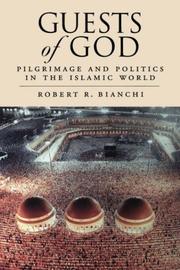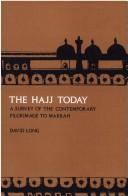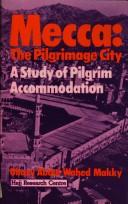| Listing 1 - 10 of 18 | << page >> |
Sort by
|
Book
ISBN: 9798890849397 1469651483 1469651475 9781469651484 9781469651477 9781469651460 1469651467 9781469651453 Year: 2019 Publisher: Chapel Hill
Abstract | Keywords | Export | Availability | Bookmark
 Loading...
Loading...Choose an application
- Reference Manager
- EndNote
- RefWorks (Direct export to RefWorks)
Pilgrimage is one of the most significant ritual duties for Muslims, entailing the visitation and veneration of sites associated with the Prophet Muhammad or saintly figures. As demonstrated in this multidisciplinary volume, the lived religion of pilgrimage, defined by embodied devotional practices, is changing in an age characterized by commerce, technology, and new sociocultural and political frameworks. Traveling to and far beyond the Hajj, the most well-known Muslim pilgrimage, the volume's contributors reveal and analyze emerging contemporary Islamic pilgrimage practices around the world, in minority, and majority, Muslim countries as well as in urban and rural settings. What was once a tiny religious attraction in a remote village, for example, may begin to draw increasing numbers of pilgrims to shrines and tombs as the result of new means of travel.

ISBN: 0195171071 0199835101 0195342119 0198038194 1429438630 9786611196943 1281196940 0199711836 Year: 2004 Publisher: New York (N.Y.) Oxford University Press
Abstract | Keywords | Export | Availability | Bookmark
 Loading...
Loading...Choose an application
- Reference Manager
- EndNote
- RefWorks (Direct export to RefWorks)
Book
ISBN: 9781009253673 1009253670 1009253697 9781009253703 9781009253666 1009253719 Year: 2024 Publisher: Cambridge Cambridge University Press
Abstract | Keywords | Export | Availability | Bookmark
 Loading...
Loading...Choose an application
- Reference Manager
- EndNote
- RefWorks (Direct export to RefWorks)
Rishad Choudhury presents a new history of imperial connections across the Indian Ocean from 1739 to 1857, a period that witnessed the decline and collapse of Mughal rule and the consolidation of British colonialism in South Asia. In this highly original and comprehensive study, he reveals how the hajj pilgrimage significantly transformed Muslim political culture and colonial attitudes towards it, creating new ideas of religion and rule. Examining links between the Indian Subcontinent and the Ottoman Middle East through multilingual sources - from first-hand accounts to administrative archives of hajj - Choudhury uncovers a striking array of pilgrims who leveraged their experiences and exchanges abroad to address the decline and decentralization of an Islamic old regime at home. Hajjis crucially mediated the birth of modern Muslim political traditions around South Asia. Hajj across Empires argues they did so by channeling inter-imperial crosscurrents to successive surges of imperial revolution and regional regime change.
Muslim pilgrims and pilgrimages --- History. --- Mogul Empire --- Civilization --- Mughal Empire

ISBN: 0585076081 9780585076089 0873953827 1438411219 9781438411217 Year: 1979 Publisher: Albany State University of New York Press
Abstract | Keywords | Export | Availability | Bookmark
 Loading...
Loading...Choose an application
- Reference Manager
- EndNote
- RefWorks (Direct export to RefWorks)
Muslim pilgrims and pilgrimages --- Hadj --- Hajj --- Mecca, Pilgrimage to --- Pillars of Islam
Book

ISBN: 9789088902857 9789088902864 9088902860 9088902852 Year: 2015 Volume: 43 Publisher: Leiden Sidestone Press
Abstract | Keywords | Export | Availability | Bookmark
 Loading...
Loading...Choose an application
- Reference Manager
- EndNote
- RefWorks (Direct export to RefWorks)
Islam --- Ethnology. Cultural anthropology --- pilgrimages --- Muslim pilgrims and pilgrimages --- Customs and practices --- Hadj --- Hajj --- Mecca, Pilgrimage to --- Pillars of Islam --- Muslim pilgrims and pilgrimages - Saudi Arabia - Mecca --- Islam - Customs and practices
Book
ISBN: 9004332367 9004325689 9789004332362 9789004325685 Year: 2016 Publisher: Leiden BRILL
Abstract | Keywords | Export | Availability | Bookmark
 Loading...
Loading...Choose an application
- Reference Manager
- EndNote
- RefWorks (Direct export to RefWorks)
In Caliphate and Kingship in a Fifteenth-Century Literary History of Muslim Leadership and Pilgrimage Jo Van Steenbergen presents a new study, edition and translation of al-Ḏahab al-Masbūk fī Ḏikr man Ḥağğa min al-Ḫulafāʾ wa-l-Mulūk , a summary history of the Muslim pilgrimage to Mecca by al-Maqrīzī (766-845 AH/ca. 1365-1442 CE). Traditionally considered as a useful source for the history of the ḥağğ , al-Ḏahab al-Masbūk is re-interpreted here as a complex literary construction that was endowed with different meanings. Through detailed contextualist, narratological, semiotic and codicological analyses Van Steenbergen demonstrates how these meanings were deeply embedded in early-fifteenth century Egyptian transformations, how they changed substantially over time, and how they included particular claims about authorship and about legitimate and good Muslim rule.
Muslim pilgrims and pilgrimages --- Islamic Empire --- Kings and rulers --- Arab countries --- Arab Empire --- Empire, Islamic --- Middle East --- Muslim Empire --- History --- Middle Eastern history

ISBN: 0856645915 Year: 1978 Publisher: London Croom Helm
Abstract | Keywords | Export | Availability | Bookmark
 Loading...
Loading...Choose an application
- Reference Manager
- EndNote
- RefWorks (Direct export to RefWorks)
Lodging-houses --- -Muslim pilgrims and pilgrimages --- -Islamic pilgrims and pilgrimages --- Pilgrims and pilgrimages, Muslim --- Muslim travelers --- Pilgrims and pilgrimages --- Flophouses --- Rooming houses --- Hotels --- Housing --- Muslim pilgrims and pilgrimages --- -Lodging-houses --- Islamic pilgrims and pilgrimages --- Hadj --- Hajj --- Mecca, Pilgrimage to --- Pillars of Islam
Book
ISBN: 9781107612808 9781107030510 110703051X 1107612802 9781139343794 1316434915 1316429946 1139343793 Year: 2016 Publisher: Cambridge Cambridge University Press
Abstract | Keywords | Export | Availability | Bookmark
 Loading...
Loading...Choose an application
- Reference Manager
- EndNote
- RefWorks (Direct export to RefWorks)
Every year hundreds of thousands of pilgrims from all over the world converge on Mecca and its precincts to perform the rituals associated with the Hajj and have been doing so since the seventh century. In this volume, scholars from a range of fields - including history, religion, anthropology, and literature - together tell the story of the Hajj and explain its significance as one of the key events in the Muslim religious calendar. By outlining the parameters of the Hajj from its beginnings to the present day, the contributors have produced a global study that takes in the vast geographies of belief in the world of Islam. This volume pays attention to the diverse aspects of the Hajj, as lived every year by hundreds of millions of Muslims, touching on its rituals, its regional forms, the role of gender, its representation in art, and its organization on a global scale.
Muslim pilgrims and pilgrimages --- 297.14 --- Hadj --- Hajj --- Mecca, Pilgrimage to --- Pillars of Islam --- 297.14 Islam: religieus leven; ascese; devotie --- Islam: religieus leven; ascese; devotie --- Islamic pilgrims and pilgrimages --- Pilgrims and pilgrimages, Muslim --- Muslim travelers --- Pilgrims and pilgrimages --- Muslim pilgrims and pilgrimages - Saudi Arabia - Mecca
Book
ISBN: 0691052972 9781400853205 1400853206 9780691052977 9780691616001 0691643342 9780691643342 0691616000 9780691616001 Year: 2014 Publisher: Princeton, N.J. Princeton University Press
Abstract | Keywords | Export | Availability | Bookmark
 Loading...
Loading...Choose an application
- Reference Manager
- EndNote
- RefWorks (Direct export to RefWorks)
On the basis of new evidence from the Ottoman archives in Istanbul, Karl Barbir challenges the current interpretation of Ottoman rule in Damascus during the eighteenth century. He argues that the prevailing themes of decline and stagnation--usually applied to the entire century--in fact apply only to the latter half of the century. This discovery, he contends, affords a more balanced and realistic view of the Near East's Ottoman past than previous studies have suggested.Originally published in 1980.The Princeton Legacy Library uses the latest print-on-demand technology to again make available previously out-of-print books from the distinguished backlist of Princeton University Press. These editions preserve the original texts of these important books while presenting them in durable paperback and hardcover editions. The goal of the Princeton Legacy Library is to vastly increase access to the rich scholarly heritage found in the thousands of books published by Princeton University Press since its founding in 1905.
Muslim pilgrims and pilgrimages --- Islamic pilgrims and pilgrimages --- Pilgrims and pilgrimages, Muslim --- Muslim travelers --- Pilgrims and pilgrimages --- Syria --- Turkey --- Politics and government. --- Hadj --- Hajj --- Mecca, Pilgrimage to --- Pillars of Islam --- History of Asia --- anno 1700-1799 --- Damascus
Book
ISBN: 9814508446 9789814508445 9789814508438 9814508438 9789814508452 9814508454 Year: 2013 Publisher: New Jersey : World Scientific Pub.,
Abstract | Keywords | Export | Availability | Bookmark
 Loading...
Loading...Choose an application
- Reference Manager
- EndNote
- RefWorks (Direct export to RefWorks)
Islamic Globalization examines the Muslim world's growing importance in creating a more inclusive international system that is increasingly multipolar and multicultural. The author describes an emerging pattern of Islamic globalization as a series of transformations in four interrelated areas - pilgrimage and religious travel, capitalism and Islamic finance, democracy and Islamic modernism, and diplomacy and great power politics. The book integrates the disciplines of religion, politics, economics, law, and international relations highlighting developments in the Middle East, South Asia, South
Globalization. --- Islamic modernism. --- Muslim pilgrims and pilgrimages. --- Finance --- Globalization --- Global cities --- Globalisation --- Internationalization --- International relations --- Anti-globalization movement --- Islamic pilgrims and pilgrimages --- Pilgrims and pilgrimages, Muslim --- Muslim travelers --- Pilgrims and pilgrimages --- Modernism, Islamic --- Islam --- Religious aspects --- Islam. --- Political aspects.
| Listing 1 - 10 of 18 | << page >> |
Sort by
|

 Search
Search Feedback
Feedback About UniCat
About UniCat  Help
Help News
News